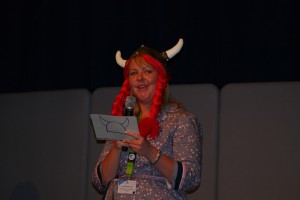The ‘good to great foundations’ session was well worth it, with more than enough material to warrant a longer session than the allocated two and a half hours. There were preceding sessions in 2011 and 2012, and the organizing group around Barry Knight and Selim Iltus (wearing white coats and Viking helmets) obviously enjoyed working on the ‘good to great’ survey, and researching ‘good to great’ literature from the for profit world. In the survey, they had asked what foundations thought would make a foundation ‘great’ – and how they saw their own institutional attitude and behaviour. Obviously the results showed serious cases of cognitive dissonance between the two. Knight and Iltus are threatening to publish a ‘hypocrisy index’ of foundations, with names of course.
 This was not a frontal teaching situation, this really was a workshop, and entertaining too. By minute two, everyone was involved (‘talk to your neighbour about…’). By minute 12, we were using the dial-meters to voice opinions. The ‘good to great survey’ presentation results had comics, more Viking panel members did a fine job in acting out the seven ‘risk-taking archetypes’, from ‘Passionate Rationalist’ to ‘Happy Go Lucky’ (too bad, only the women’s helmets were adorned with beautiful pink braids – too risky for men to wear?). In moderated groups, we were to discuss our own risk archetype. Mine was a bit large to go in depth but prompted thinking, judging by the fact that (besides me) not too many people were looking at devices.
This was not a frontal teaching situation, this really was a workshop, and entertaining too. By minute two, everyone was involved (‘talk to your neighbour about…’). By minute 12, we were using the dial-meters to voice opinions. The ‘good to great survey’ presentation results had comics, more Viking panel members did a fine job in acting out the seven ‘risk-taking archetypes’, from ‘Passionate Rationalist’ to ‘Happy Go Lucky’ (too bad, only the women’s helmets were adorned with beautiful pink braids – too risky for men to wear?). In moderated groups, we were to discuss our own risk archetype. Mine was a bit large to go in depth but prompted thinking, judging by the fact that (besides me) not too many people were looking at devices.
 The presenters were relaxed enough to actively invite questions from the audience. One of us made an objection: we should really be addressing the problem that the sector generally does not take on risk as it should, given the fact that only foundations possess the kind of decision making structure that enable them to go ahead and do the riskier things – more so than NGOs and government.
The presenters were relaxed enough to actively invite questions from the audience. One of us made an objection: we should really be addressing the problem that the sector generally does not take on risk as it should, given the fact that only foundations possess the kind of decision making structure that enable them to go ahead and do the riskier things – more so than NGOs and government.
One more verbal exchange caught my interest. Presenter: ‘You cannot have it all. You can either be sharply focused, or you can consult everybody in the world. As soon as you talk to people it gets confusing.’ Response from the audience: ‘No, you can do both, it’s in the timing – first you speak with people, then you get focused, together.’
Ise Bosch is the founder of Dreilinden gGmbH




Comments (1)